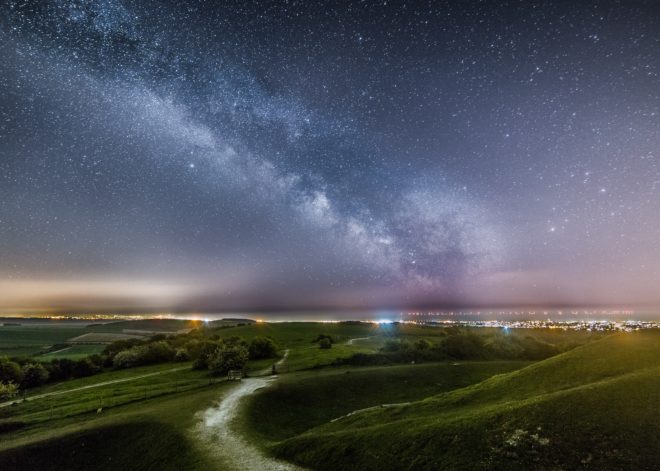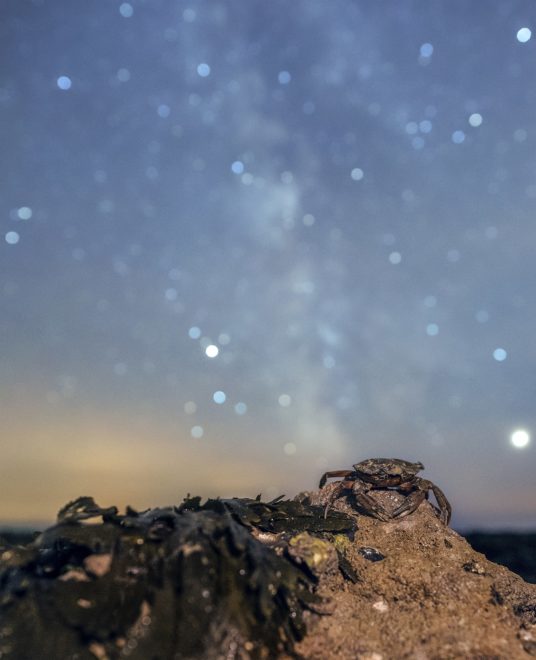Win £100 prize by capturing dazzling spectacle of starry night sky
October 29, 2021

The captivating Dark Skies of the South Downs National Park will be celebrated once again this autumn and winter as the popular astrophotography competition returns.
As the clocks go back and the cosmos comes into view earlier in the evening, people are being invited to capture the beauty of the night sky in and around the National Park.
This year there are three categories, plus an additional element – the beautiful Milky Way, which can be admired on a clear night from the National Park’s Dark Sky Discovery sites. The Milky Way is the galaxy that includes our solar system, with the name describing the galaxy’s appearance from Earth: a hazy band of light in the night sky. It’s estimated to contain well over 100 billion stars and at least that number of planets.
The categories are:
- South Downs Dark Skyscapes – an image that captures the star-studded Dark Skies of the South Downs National Park. Judges will be looking for awe-inspiring photography that shows off the landscape and/or cultural heritage and the dark skies above it!
- Living Dark Skies: people and nature – any image that captures human or wildlife activity. Ideas include images of people stargazing, people running or walking under the cover of darkness, or images of nocturnal wildlife or trees at night.
- Our Magnificent Moon and/or Milky Way – judges will be looking for a breathtaking shot of our nearest neighbour in the solar system and/or a heart-stirring shot of our immense galaxy.
The South Downs Dark Skyscapes category must be taken in the South Downs, but there is no geographical limit on the two other categories and it’s hoped people living in towns and cities around the National Park will take part.
The first prize for each category will be £100, with a runner-up prize for each category of £75.
Judging the contest will be Dan Oakley, “Dark Skies” Ranger for the National Park, Graham Bryant, a Fellow of the Royal Astronomical Society, and Petersfield-based Tiffany Francis-Baker, author of Dark Skies.
Dan said: “We’re really excited to be holding our second astrophotography competition after the success of last year’s contest where we had well over 150 incredible images to judge.
“The South Downs National Park is still one of only 17 International Dark Sky Reserves in the world, so it’s a very special status. If you haven’t seen a South Downs skyscape on a clear night, I would encourage you to! It really is an awesome spectacle and develops a powerful sense of connection with the universe that we live in.
“We have some of the best, and most accessible, views of the stars anywhere in the UK and I would encourage people to check out our 10 Dark Sky Discovery Sites that offer a great way of seeing uninterrupted views of the stars, moon, and if you’re lucky, the Milky Way itself.
“It doesn’t matter if you’re accomplished astrophotographer or a total novice, we’re keen to see a range of photographs that show off the spectacle of the big universe out there.”
The winners will be revealed during the National Park’s Dark Skies Festival in February 2022. Details of the festival will be announced at a later date.
Details of the Dark Sky Discovery Sites can be found at www.southdowns.gov.uk/dark-night-skies/where-to-stargaze. These locations are free from the effects of urban light pollution, offer good public access and great sightlines to explore the wonders of the night sky.
For entry details and to download an application form visit www.southdowns.gov.uk/AstroPhotoComp
The deadline for competition entries is midnight on 12 January, 2022.
Here are some top tips from Dan Oakley to help you make the most of stargazing in the South Downs:
- Check the phase of the moon to plan your trip – stargazing is best before a full moon
- Take a blanket or mat to lie on
- Wrap up warm
- Take some snacks and a hot drink
- Take a compass or use the one on your smart phone
- Download a star gazing app to help you identify constellations and stars
- Allow time for your eyes to adjust – this takes around 20 minutes so turn off any lights, torches and preferably put your mobile phone away (at least when not taking pictures if you are using it to photograph)
- Leave no trace – remember to take any rubbish home with you.

